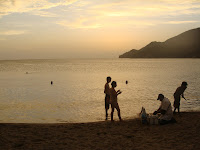So schnell kann´s gehen. Heute morgen startet alles wie erwartet: Der Portier diskutiert mit mir über Samstag, mein Chef spricht nicht mit mir, die deutschen Partner fragen, ob Sicherheitsgefahren bestehen. Doch dann kommt überraschend die Wende. Am Abend wird mir klar, welches ganz grosse Spiel Argentinien grade wirklich spielt.
 28. Juni 2010, 41 Jahre nach dem Stonewall-Aufstand. Vor dem Kongress in Buenos Aires versammlen sich mehrere 10.000 Menschen, um für die Hochzeit von Schwulen und Lesben einzutreten. Am 14. Juli wird der argentinische Senat (Vertreter der Provinzen) darüber abstimmen, ob Argentinien die Ehe Schwulen und Lesben öffnet.
28. Juni 2010, 41 Jahre nach dem Stonewall-Aufstand. Vor dem Kongress in Buenos Aires versammlen sich mehrere 10.000 Menschen, um für die Hochzeit von Schwulen und Lesben einzutreten. Am 14. Juli wird der argentinische Senat (Vertreter der Provinzen) darüber abstimmen, ob Argentinien die Ehe Schwulen und Lesben öffnet.Das argentinische Unterhaus hatte bereits im Mai für die Gleichstellung homosexueller Paare gestimmt. Ein unglaublicher Erfolg, der noch vor ein paar Jahren undenkbar gewesen wäre. Vorausgegangen war dem Votum ein Gerichtsurteil, das die Geltung der Ehe nur für Heteros als verfassungswidrig einstufte und die Heirat eine schwulen Pärchens zuliess. Das löste eine Lawine aus. Viele andere Schwule und Lesben folgten, um sich gerichtlich Zugang zur Ehe zu verschaffen. 4 rechtskräftige Homo-Ehen zählt Argentinien bereits. Die Legislative muss nachziehen. Und plötzlich sind alle dafür. Unter Druck bildet sich ein bereites Parteienbündnis von Teilen der Konservativen, Sozialdemokraten. Peronisten, Linken und stimmt im Hauruckverfahren für die Homo-Ehe. Jetzt fehlt nur das Oberhaus. Im Senat wird es spannend werden, der Ausgang ist offen.
Und was ist das für ein Gesetz! Der Entwurf sieht vor, im Paragrafentext einfach die Worte Mann und Frau durch Partner zu ersetzen. Einfach austauschen. Kein neuer Paragraph, kein neuer Abschnitt, kein neuer Satz. "Partner" sollen die Ehe führen. Und plötzlich wird die Ehe ein homo-offenes Institut, mit selbstverständlichem Zugang zu allen Rechten und Pflichten. Argentinien wäree das erste Land Lateinamerikas, das die Ehe den Homos öffnet.
Wir kleinlich waren wir Deutschen dagegen in 2001, als wir das Lebenspartnerschaftsgesetz einführten. Schon der Titel macht klar, und das ganze Rechtsinstitut will es so: Die Homos sind anders. Ihre Liebe ist anders. Ihre Rechte auch. Eine Rednerin kommentiert auf der Bühne diesen Vorschlag, der auch in Argentinien die Runde macht. Hätten sich die Schwarzen vor einigen Jahrzehnten freuen sollen, dass sie auf den Bänken hinten im Bus Platz nehmen mussten? Hauptsache, sie durften überhaupt mitfahren?
Die, die jetzt laut gegen das Gesetz schreien, sagt ein anderer, die seien der beste Beweis, dass wir das Gesetz brauchen. Das argentinische Volk wolle und brauche mehr Gleichheit, es solle wie bei der Aufarbeitung der Diktatur wieder voran gehen und die Menschrechte verwirklichen. Dann singt der ganze Platz die Nationalhymne: Libertag, libertad, libertad.
Vamos Argentina! Das ist ganz grosser Fussball!





















